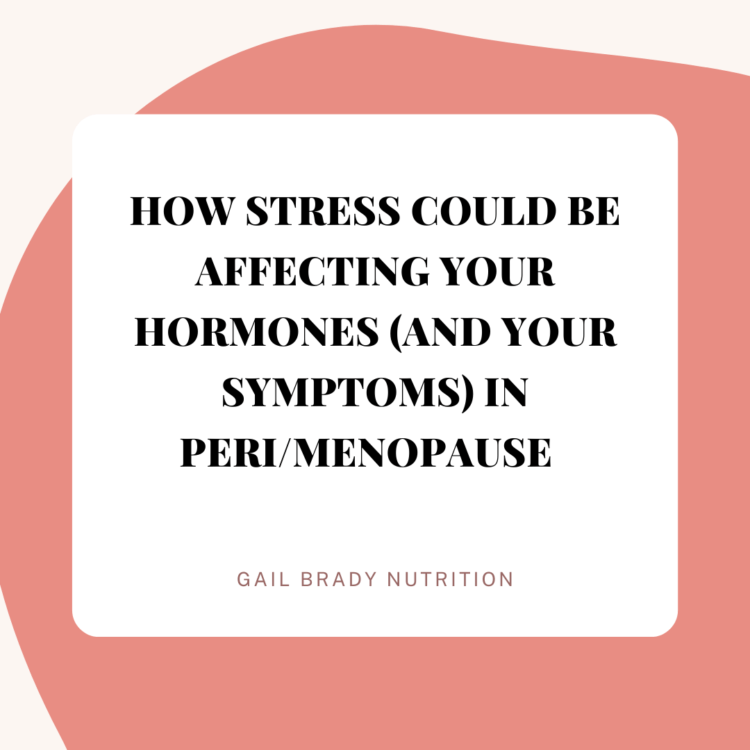YOUR ADRENAL GLANDS
Your adrenals are 2 small glands that sit above the kidneys.
They are responsible for the secretion of several hormones, including the stress hormones adrenalin and cortisol. Cortisol is also vital for life.
During perimenopause, the adrenal glands also take over from the ovaries and become responsible for producing your main source of oestrogen, as well as a small amount of progesterone. This stops these hormones from flatlining and can help to manage symptoms.
Problems can arise if your adrenal health has been compromised due to chronic physical, emotional or mental stress.
This stress can come from many sources including overexercising, poor sleep, a poor-quality diet, food sensitivities, undereating, blood sugar imbalances, a gut imbalance, pain and inflammation etc
All these issues can cause increases in cortisol. And all of the issues can over time cause the adrenal glands to function sub-optimally.
CORTISOL AND WHY IT MATTERS
Cortisol is a stress hormone but it is also released as part of your body’s natural daily rhythm.
You cannot live without cortisol, it is essential to life
When working optimally, you should experience an increase in cortisol first thing in the morning when you open your eyes.
This is called the cortisol awakening response. It should make you feel alert and ready to take on the day. However, this is often not the case…
If your sleep is disturbed from hot flushes or night sweats or a blood sugar imbalance, this can cause cortisol to spike too early… and you may find it hard to get back to sleep or wake in the morning not feel refreshed.
Throughout the day levels should decline. The typical pattern is a drop around midday, a flattening out in the afternoon and a decrease slightly before bed.
It is when your natural flow of cortisol is disrupted, that you may notice symptoms starting to occur. This can happen over time when stress is prolonged… Your adrenals will keep producing more and more cortisol until the signals are no longer recognised and the feedback system stops working effectively. Eventually, cortisol may become too low.
THIS IS WHAT CAN HAPPEN WHEN YOUR CORTISOL LEVELS ARE INCREASED
- Your blood pressure can increase
- Your immune function is impaired
- Your digestion is compromised
- Your thyroid hormones are suppressed
- Your blood sugar balance is disrupted
- And, ovulation is delayed
If your cortisol remains elevated it can also lower progesterone (they are made from the same base hormone). It can also lead to inflammation and affect your bone health
Basically, your body prioritises the need to run away over body functions that are not life-threatening if put on hold.
Some of the symptoms of compromised adrenal health include:
- Low energy and fatigue
- Disrupted sleep
- Irregular periods
- Poor exercise recovery & muscle soreness
- Increased cellulite
- Weight gain – especially around the middle
- Overwhelmed by everyday activities
- Increased peri/menopause symptoms
- Low libido
- Feeling “Wired but tired”
- Feeling light-headed or dizzy when you stand up
- Difficulty falling or staying asleep
- Heart palpitations
- Lower back pain
HOW DO WE TEST ADRENAL HEALTH?
There are several ways to do this but the test I recommend most often is the DUTCH hormone test as it gives you so much information about your hormone health including the adrenals.
HOW CAN YOU SUPPORT YOUR ADRENAL HEALTH?
- Stress management – Meditation, massage therapy, deep breathing, yoga, walks in nature, Epsom salt baths, reading… whatever works for you
- Getting adequate rest and sleep – you can refer back to my post on sleep here
- Blood sugar and insulin management – visit previous posts
- Nutritional supplements and herbal adaptogens – recommendations for these would depend on symptoms/test outcomes.
Unfortunately, conventional medicine currently only recognises adrenal issues at extreme ends of the spectrum, Cushing’s where cortisol is very high and Addison’s where cortisol is very low.
If you need any further information, please email me at gail@gailbradynutrition.com. You can find out more about my testing packages here
For more tips and advice on perimenopause and menopause join a growing group of like-minded women here
To receive your FREE checklist of the Top 10 Foods to Include in Your Diet During Menopause click here





